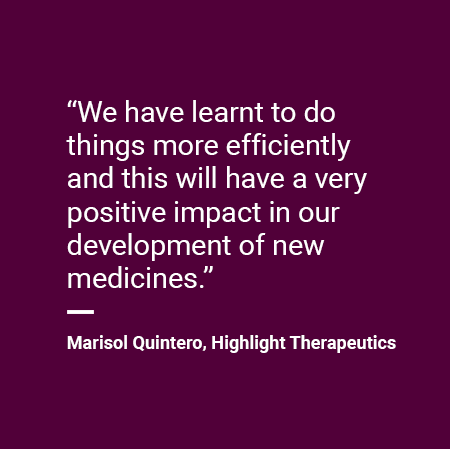Scrip Asks…What Does 2021 Hold For Biopharma? Part 2: COVID-19 Shock Waves And Silver Linings
17 Ways In Which Pandemic Will Change Biopharma Industry
Executive Summary
Executives expect the changes wrought by necessity in the face of a global pandemic to have lasting effects, both positive and negative, on the biopharma sector. Here they share their predictions for the coming year.
SCRIP ASKS…What Does 2021 Hold For Biopharma?
A broad survey of the industry's expectations for the year to come
Every December, Scrip asks industry leaders and experts to share their expectations for the year to come. With responses from more than 200 professionals, Scrip Asks…What Does 2021 Hold For Biopharma? provides an unprecedented insight into the biopharma universe's collective crystal ball. With the hopes of global humanity's recovery from the COVID-19 pandemic resting so heavily on this sector, our second installment focuses on the knock-on effects of the pandemic on the industry. The full list of installments:
- Tackling COVID-19
- COVID-19 Shock Waves And Silver Linings
- Patient Access To Health Care
- Technology And Disease
- Business Environment And Strategy
"The coming year will be remembered for the epic alteration to our society." These words from Pam Contag, CEO and co-founder of BioEclipse Therapeutics, Inc., encapsulate the enormity of COVID-19's effect on humanity. While much energy will continue to be expended by the biopharma industry in taming the virus and reducing its impact in 2021, we will also start to see how changes in the way things are done, brought about by necessity in 2020, will lead to longer-lasting and far-reaching alterations.
As Ilya Yuffa, president of Eli Lilly Bio-Medicines, said, "The past year has taught us to be laser-focused on big, innovative priorities while making the most of what we have at Lilly to help continue to save and improve lives." Pharma rose to the challenge in 2020 and this went beyond developing drugs and vaccines for COVID-19.
"In 2020, biopharma has come through not only as a savior in the pandemic by creation of life-saving vaccines, but also as a bright spot in the economy where people have continued to find employment and growth," said Mahesh Karande, president and CEO of Omega Therapeutics, Inc. "This dual status will continue in 2021. We will see newer and bolder approaches to biology and continued tackling of previously undruggable targets and diseases. 2021 will go down as one of the golden years of biopharma."
This excitement about the future potential of the biopharma industry was widely shared among the 200+ respondents to Scrip's call for predictions for the coming year.
Also reflecting the general mood of optimism was Usman "Oz" Azam, president and CEO of Tmunity Therapeutics Inc. "2021 will be a transformative year for biopharma and the life sciences. It will be the year where the credibility and power of science applied to human health will shine.
"It's the year that we will hopefully recognize the personal investment by countless women and men in the life sciences around the world that tirelessly helped to stem a modern pandemic by developing innovation at breakneck speed. It's the year where we will dare to say we can see a path to 'cure' certain diseases. It's the year we will realize hope after the dark."
In this second installment of our series, we drill down into expectations around the wider impact of the COVID-19 pandemic on the biopharma industry. Divided into 17 general areas, the outlook among industry experts and executives is largely positive, with improved collaboration and efficiency, accelerated adoption of digital technologies and increased appreciation of and investment in R&D among the silver linings of the pandemic.
Click on the cards to read more predictions from industry leaders.
Collaboration
"2020 demonstrated our resilience and ability to collaborate and act quickly as an industry," said Jean-Christophe Tellier, CEO of UCB S.A. "I expect 2021 will allow for continued opportunities for biopharma to demonstrate leadership across healthcare and society writ large, including continued collaboration across companies and across industries. [We] will continue to have greater impact when we work together to deliver for patients now and into the future."
Collaboration to develop COVID-19 solutions demonstrated that partnership is an excellent way to find answers to hard problems, and to find them fast.
"As tragic as the COVID-19 pandemic has been for society, the ability of pharmaceutical and biotechnology companies to so rapidly develop vaccines and therapeutics has been inspirational. Key to this was a willingness by several of these companies to form partnerships that leveraged the core competencies of each company to achieve the desired result," said Travis Mickle, president and CEO of KemPharm, Inc. "This 'partnership-of-equals' approach has fallen out of favor over recent years, supplanted by a 'my-way-or-the-highway' model. The experiences from COVID-19, I believe, will encourage more companies to form true collaborations, recognizing that great accomplishments are much more difficult to achieve on one's own."
Karin Rosen,chief scientific officer of Horizon Therapeutics plc, underlined how "cross-company and cross-industry collaboration fueled the biopharma and medical device industry's pandemic response." She predicted that the changes will have knock-on effects for drug development more broadly: "A similar effort will be harnessed more broadly in 2021 and beyond to find breakthrough medicines for difficult-to-treat diseases where innovation may have previously been stalled. If anything, the race to a safe and effective vaccine has reinvigorated the life sciences industry, and paved the way for faster medicine development."
Anne Heatherington, head of the Data Sciences Institute, Research & Development, at Takeda Pharmaceutical Co. Ltd., agreed. "We'll continue to see increased collaboration across partners in the ecosystem, be it on platform clinical trials, data, expertise or methods, leading to enhanced efficiencies to bring much-needed therapies to patients faster. Lastly, COVID-19 has accelerated the application of data and digital in drug development, I expect 2021 will see increased utilization and acceptance of both real-world data and digital tools in 'normal' circumstances given our reliance on them during the pandemic."
And the collaboration will not only be between companies, as Alexander Hardy, CEO of Genentech, Inc. , noted. "We will continue to partner with government agencies, industry peers and other key stakeholders to deliver on new solutions and find operational efficiencies - originally developed out of urgent need - that we'll bring with us into the post-pandemic working world."
R&D Processes
"No matter what role you play in the development of new medicines, we will all be asked to look at life through the lens of what the industry has achieved in 2020. To believe that anything is possible," commented Duncan Emerton, director of Informa Pharma's Custom Intelligence and Analytics division. "From a standing start to having a COVID-19 vaccine approved in the UK in less than a year, a process that ordinarily takes the best part of a decade, is, on the one hand, an astounding achievement, but on the other, is likely to drive many to ask if pharma can do the same in other areas of R&D."
Emerton believes that the industry has a once-in-a-lifetime opportunity to create lasting change to the way in which medicines are developed. "The industry has shown what's possible. What it has achieved in terms of COVID-19 vaccines development has surpassed even the wildest of expectations. It's now down to the industry to take a long look at itself and ask; is this a black swan event that will never be repeated, or can we harness the 'Spirit of 2020' in other areas of new medicines discovery and development?"
Recognizing the "tremendous progress in COVID-19 therapeutic development" seen over the past year, Phil Jones, vice president, therapeutics discovery, at the
University of Texas MD Anderson Cancer Center, predicted that "2021 will be the year this progress percolates into mainstream biopharma research and development. The huge upheaval of processes and leveraging e-technology have brought dramatic improvements in efficiency, and I expect this to help streamline efforts across the industry. I also expect to see streamlining of our clinical trial efforts given the dramatic shift to virtual care and remote monitoring."

Adi Hoess, CEO of immuno-oncology firm Affimed N.V., said biotech companies had been "galvanized by our ability to advance our therapies, establish new partnerships and unlock the power of our scientific discoveries in the name of people who need a glimmer of hope. There's a renewed focus and confidence in the industry where even more meaningful strides can be made for patients in 2021." Key to their success in making "what might seem impossible, possible" will be "remaining collaborative and nimble."
Catherine Beech, CEO of Exonate Limited, a spin-out of the University of Nottingham focused on developing eye drops to treat wet age-related macular degeneration and other vision loss, exhorted her peers to carry the learnings from 2020 into the coming year. "2020 has shown us that great science can be translated into clinical candidates very fast when we need to. In 2021 we should build on our successes this year, continue to use remote ways of problem solving and the realization that there is no one answer to drug discovery. Collaboration within teams and between companies or academia augments and speeds up success," she said. "I think we have a strong future."
Clive Dix, CEO of C4X Discovery Holdings plc and interim chair of the UK's Vaccine Taskforce, agreed. "This year has highlighted the ever-growing need for innovation in drug discovery and shone a light on how the pharmaceutical sector can quickly adapt and make a meaningful impact on humankind when it's facing one of its greatest challenges. The speed at which vaccines have been developed is immense and there is potential for this to continue across all clinical trial work in the future, so I'm hoping to see a more efficient and faster regulatory and development process for new life changing therapies after the pandemic."
Regulatory Processes
From rules around clinical trials to the efficiency of drug review pathways, COVID-19 has the potential to change regulatory practice for the long term, and the general view is that the result will be to reduce the time it takes to bring new products to market.
"2020 will be known as the year the biopharmaceutical industry (re)designed healthcare – and it will have enduring implications on the way we do business in 2021 and beyond. The industry has long talked about being patient-centric and this year the world truly brought it to life," stated Rick Winningham, chairman and CEO of Theravance Biopharma Inc. His company is a member of the COVID R&D Alliance, which he said "broke down barriers between 20+ companies, regulators and the public" in a way that he expects to have a lasting impact.
"For example, we worked collaboratively with regulators to decentralize one of our clinical trials, balancing in-person and remote healthcare to improve safety for patients and healthcare professionals. This allowed participation from patients at home while ensuring data integrity in a clinical trial program we are conducting in a fragile patient population. This change was embraced by the community and will hopefully have a lasting imprint on how clinical trials are conducted far into the future. Moving forward, collaboration across industry, regulators, government, and academia and identification of innovative solutions must be the norm as we build a greater focus on supporting patients and their families."
"It may be too soon to see regulatory flexibility necessitated by COVID-19 bleed through into general R&D," cautioned Dan Chancellor, director of thought leadership, Datamonitor Healthcare, "but expect the conversations to continue as to how best to capture the benefits of speed – such as real-time, rolling reviews outside of oncology."
"Something we have observed as a rare disease company and more broadly as an industry during the pandemic is regulators' flexibility and willingness to identify pathways to address the urgent health crisis," commented Chris Peetz, CEO of Mirum Pharmaceuticals, Inc., which is developing treatments for rare liver diseases. "Regulators have shown an ability to rigorously and rapidly assemble, collaborating closely with industry in a collective effort to help those in need. As we head into 2021, the continued close communication between the agencies and industry will be instrumental in helping to rapidly advance treatments for rare diseases which are in dire need of life-saving therapies."

Philippe Pouletty, CEO of Truffle Capital and chairman of Abivax SA – which is developing treatments for inflammatory, oncology and viral indications with one candidate under investigation for COVID-19, was another who observed that the shared goal of beating COVID-19 had significantly improved the relationships between companies, clinicians, regulators and state institutions. "In 2021 we can build on [those] fruitful dynamics…Greater speed and better collaborative spirit without compromising rigor and safety! We hope these new dynamics will continue to prevail to accelerate the development of novel therapies in different areas of high medical need." However, he pointedly highlighted the need for close harmony between authorities, which is still not a given: "Hopefully, the EU will behave as a federal entity rather than a collection of states in healthcare."
Clinical Trials
The massive impact of COVID-19 containment measures on how patients accessed health care in 2020 had huge repercussions for the conduct of clinical trials. Some foresee ongoing disruption, although many of those surveyed believe that temporary solutions to the new problem will lead to long-lasting changes, and some expect a return to some form of normal in 2021.
"In 2021, at least for the near term, COVID-19 will loom large in the drug development space. The widespread slowdown in recruitment for non-COVID-related clinical trials will likely persist through spring and new clinical trial agreements will take longer to prosecute due to administrators and institutional review boards continuing to work remotely," predicted Robert Fallon, president, CEO and co-founder of oncology drug developer Phosplatin Therapeutics.
"COVID-19 will undoubtedly continue to have an impact on clinical trials well into 2021. We have seen trials start during the pandemic with mixed results as far as enrollee counts go," said George Cardoza, president of Pharma Services, NeoGenomics, Inc. "The hope of many in the industry is that perhaps by the second quarter the clinical trial process returns to a more normal state and they are able to reach their enrollment count targets. Of course, delaying a study start can result in lost ground to the competition who may not be waiting," he added.
Gil Van Bokkelen, CEO of regenerative medicine company Athersys, Inc., expected to see an "effort by many hospitals and companies to return to normalcy with respect to the conduct of clinical trials that have been disrupted by COVID-19 as vaccines come on line and begin to stabilize things" but warned "that likely won't be achieved until mid-late in the year."
On the other hand, as Ron Cooper, president and CEO of liver disease-focused Albireo Pharma, Inc., pointed out, "Despite the impact of the pandemic, biopharma companies were able to complete clinical trials and regulatory milestones in 2020."
In Cooper's view, "in 2021, we can't assume life will go back to pre-pandemic days." Nevertheless the 'new normal' may not be a bad thing: "Through trial and error, we've learned new ways of working with clinical sites (remote communications and trainings, etc.) to keep them on track with enrolling and pushing forward, while also maintaining social distance requirements. Biopharma companies that have implemented these protocols successfully will likely find themselves in a position to be more nimble and efficient with trial recruitment and execution, which may translate to bringing medicines to market at a faster pace."
Peyton Howell, executive vice president and chief commercial and strategy officer of contract research organization Parexel International Corp., also told Scrip that businesses in the CRO space would "apply the lessons learned [in 2020] with a #NoGoingBack mentality." She expected to see "an increased adoption of decentralized clinical trials (DCTs), also known as virtual clinical trials, a heightened focus on diversity and access to clinical trials, along with a continued focus on the heart of everything we do – patients."

Stuart Peltz, founder and CEO of rare disease company PTC Therapeutics, Inc., similarly noted that "a crisis can create an opportunity to change."
"It is clear that the pandemic stimulated a plethora of new ideas on how to do clinical trials...This included remote patient assessments, telehealth evaluations, and remote monitoring devices," he added. "This trend will continue, and despite the new virtual format, we have not jeopardized the quality of care for the patients. In fact, my view is this new format can actually accelerate trial enrollment in 2021 – particularly for patients living with rare diseases who are often geographically far from the appropriate study center(s) or can't travel."
He concluded: "I believe the changes we made are here to stay – in a good (and virtual) way."
Bruno Gagnon, senior vice president development operations at BridgeBio Pharma, Inc. and Eidos Therapeutics, Inc., agreed. "COVID-19 has transformed how we manage clinical trials and created efficiencies that are likely here to stay post-pandemic. By sending investigational products directly to patients, facilitating telehealth appointments and helping arrange safe transportation when on-site procedures are needed, we've made participation simpler and easier and as a result, our trials haven't suffered, and many are actually ahead of schedule."
"In 2021, I expect to see a change in operations from the industry as a whole, especially regarding clinical trial management. As the COVID-19 pandemic unfolded many biotech and pharma companies worked to adapt protocols to make necessary accommodations to ensure the safety of their patients. This included the establishment of virtual protocols and at-home visits. I believe that these processes will continue to be implemented and improved and may even become a new norm within the field, in particular for companies working to develop therapies to address patients with immune deficiencies or who are immunocompromised," commented Paula Ragan, CEO and president of X4 Pharmaceuticals, which is developing products to treat rare immunodeficiency disorders and other orphan conditions.
Another executive in the rare disease space, Camille Bedrosian, chief medical officer and executive vice president of Ultragenyx Pharmaceutical Inc., also underlined the particular benefits of innovation around clinical trial processes for the development of orphan drugs. The adoption of "remote informed consent, central IRB approvals, home health services, telemedicine with investigators, seamless trial designs and utilizing real-world evidence to support new therapy approvals" are among the innovations she expects to see cemented in 2021. "This will be especially true in rare diseases, where there is often a lack of drug development precedence and trailblazing is the norm," she added.

Meanwhile, Thomas Lingelbach, CEO of vaccine developer Valneva SE, thinks the unprecedented public interest in drug development occasioned by the pandemic will have a positive impact on companies' ability to recruit study volunteers. "More people than ever before became invested in learning about clinical trial procedures, approvable endpoints and review boards. Having a public that is better educated about the biotech industry will have positive effect in 2021 and moving forward," he predicted. "I think people are more aware of the need and value in participating in clinical trials. The net effect of this is that enrolling all clinical trials could become easier, helping address a constant challenge facing clinical-stage companies."
François-Henri Boissel is CEO of Novadiscovery, a French health tech company with a clinical trial simulation platform, which in December 2020 signed a deal with Janssen. He sees the industry's experience of 2020 accelerating the evolution of clinical development into the in silico realm, with greater regulatory buy-in: "The COVID-19 pandemic has prompted pharmaceutical companies to re-evaluate their reliance on traditional clinical trials, and the adoption of in silico trials (or clinical trial simulation) will increase at a higher rate in 2021. This follows 2020's events, but also builds on the momentum of the emergence of in silico over the past few years and increasing commitment from regulatory agencies to incorporating in silico data into submission documents."
Digital
"Many companies discovered that their HQ digital capabilities in the commercial (as selling got disrupted) and R&D worlds (as trials got disrupted) are just not up to snuff, so many are belatedly investing heavily to get better," observed Pratap Khedkar, a principal with consulting firm ZS Associates. "This is also a capability change across the world – so the challenge has been how to scale it across dozens of countries without cost overruns?"
Expect this question to remain prominent throughout 2021 as digital acceleration is likely to be the name of the game.

"Biopharma has been on the path of digital transformation, and genomics and advancement of machine learning and AI all played main roles to initiate such transformation," commented Lihua Yu, president and chief data science officer of Eisai Co., Ltd.'s precision oncology discovery subsidiary, H3 Biomedicine. "COVID-19 served as both a reset to align the multiple stakeholders within the same organization or across industry, and as an accelerator to adopt digital solutions. This trend will continue."
Anne Heatherington, head of the Data Sciences Institute, Research & Development, at Takeda Pharmaceutical Co. Ltd., agreed: "COVID-19 has accelerated the application of data and digital in drug development, I expect 2021 will see increased utilization and acceptance of both real-world data and digital tools in 'normal' circumstances given our reliance on them during the pandemic."
Steve Davis, CEO of ACADIA Pharmaceuticals Inc., identified the use of telemedicine as one of the "fastest drivers of change" following the response to COVID-19, and Mimi Keshani, VP of operations at deep tech startup Hadean, also sees the pandemic driving forward adoption of digital solutions by patients and health professionals. "COVID-19 has caused an unexpected increased need for remote services, adding a further weight to technology. Digital therapeutics, telemedicine and remote monitoring through wearables will continue to boom as people look to access health care away from the clinic," she forecast.
Cognito Therapeutics, Inc. develops digital therapeutics for neurodegenerative disease, and recently received FDA breakthrough designation for its neurostimulatory approach to Alzheimer's disease. "I think we'll see some positive effects in the digital therapeutics (DTx) space," commented CEO Brent Vaughan. "With the increased focus on tele- and at-home care, companies like Pear Therapeutics, Akili and others were able to accelerate the market access of their prescription DTx's through EUAs [emergency use authorizations], expanded enforcement discretion and faster approvals from the FDA. I do not expect to see a pull-back on this in 2021."
This was a view shared by Sarah Howell, CEO of Arecor Ltd., which develops novel formulations of biopharmaceuticals. "We have seen an unprecedented acceleration in the uptake of digital health and life science technologies in 2020, due to necessity during the COVID-19 pandemic. I think this will continue into 2021," she said. "We see this very much in the management of diabetes where a powerful combination of smart algorithms, continuous blood glucose monitoring, next-generation delivery devices and improved faster acting insulins can enable transformational treatment options such as the artificial pancreas which enables very precise and individual control of blood glucose for each patient individually. I expect we will see many more of these breakthrough digital-device-therapeutic combinations through 2021 and beyond now the door is open."
Michael Seggev, chief commercial officer of artificial intelligence-based health technology company Vocalis Health, emphasized how the exigencies of the pandemic should help identify a path forward for companies that have struggled to convert digital health opportunities into reality.
"For years, biopharma companies have had chief digital officers or digital strategists presenting the vision of what the future may bring for biopharma with the application of digital health technologies – but until 2020, this has been mostly hypothetical, with most companies finding it difficult to define a practical commercial strategy for value creation with digital health tools," he observed.
"But as a result of COVID, the reality on the ground today has rapidly changed, and the barriers have fallen; we now have physician acceptance, customer demand, technological readiness and reimbursement approval for digital health technologies, and smart biopharma players will move quickly to implement and experiment with these technologies.
"Whether these technologies are software based, or incorporate hardware or wearables, digital health tools can enable personalized treatment, improve diagnostics, lower readmissions, lower costs and improve patient outcomes. They can be incorporated by biopharma players to add value to their offerings and enable differentiation from the competition. Pharma is in an excellent position right now to move quickly on these technologies, and those that are brave and forward thinking stand to gain in 2021."
Investment
One thing our crystal ball gazers were agreed on was that biopharma will enjoy healthy levels of investment in 2021.
"In 2020, biopharma demonstrated an ability to help address a healthcare crisis of global proportions with the rapid development of a vaccine for COVID-19. As a result of this massive research effort, a broad range of investors have flocked to life sciences and I expect that this trend will continue well into 2021," predicted Adam Levy, CFO of Spanish drug developer Sanifit.
For Nello Mainolfi, co-founder, president and CEO of Kymera Therapeutics, Inc., the fact that "In 2020, biopharma was the industry that responded to the global call for a solution to a once in a century pandemic that has crippled world economies and caused so much death and despair" translates to expectation and hope that "In 2021 we will see full realization and appreciation of the global social impact of this industry, translating to greater investment into biotech and bigger bets on technologies to address unsolved diseases and historically undrugged targets."

Jonathan Steckbeck, founder and CEO of Peptilogics, Inc., agreed. "2021 continues the positive momentum built around the overwhelmingly successful efforts the industry put into solving the Covid-19 crisis, with drugs and vaccines taken from discovery through EUA [emergency use authorization] in less than nine months, with the vaccines demonstrating 95% efficacy," he said. "This will continue to engender investor confidence, and great companies with solid science will continue to find the support they need to move their medicines forward."
Where exactly the money goes remains to be seen. "Like many, I'll be interested to see where the dust settles following the pandemic disruption," commented Dan Chancellor, director of thought leadership at Datamonitor Healthcare. "Will there be any long-lasting reprioritization in R&D assets and deal-making activity following the incredible investment in vaccine technologies and manufacturing, or more likely a return to oncology, rare diseases and advanced therapies?"
In any case, "beyond the critical short-term value of up-coming Covid-19 treatments , the industry as a whole will be able to greatly benefit from the massive investments in discovery, manufacturing and distribution these treatments require," noted Chris Bradley, Loki Therapeutics CEO and co-founder.
Operating Models
This year will see companies continue to operate in emergency mode: As David Horn Solomon, CEO of rare disease company Pharnext SA, said, "2021 will be a COVID year and, as an industry, we will still have to adjust our business plans according to this crisis."
Many believe those adjustments could – and should – last beyond the immediate crisis.
David Arthur, CEO of Salarius Pharmaceuticals, Inc., warned: "The COVID-19 pandemic has had a wide-reaching effect on the biopharmaceutical industry in ways that we were and still are unprepared to address."
"Because cancer and other life-threatening diagnoses occur even during a pandemic, and do not shut down or socially distance, COVID-19 has raised the bar for what is required of our industry to continue the fight. The pandemic has demonstrated that investment in biotechnology remains critical to society and can lead to life-saving medicines, as evidenced by the successful development of vaccines and therapeutics for COVID-19, many from biotechnology companies. While we are, hopefully, beginning to move beyond COVID-19, the biopharmaceutical industry needs to adjust how it operates and recognize the new normal facing drug development. We have the opportunity to apply our learning from Project Warp Speed as a shining example to how we can address the many diseases which remain drastically underserved, including rare and childhood cancers which are the most devastating of all."

Arthur was not the only one to identify the opportunity presented by the crisis. "I think 2021 should be an exciting time for the industry," said Greg Rotz, a principal at PwC US, specializing in life sciences strategy. "Certainly, there has been a lot of learning in 2020 about collaboration and how to think through accelerated development of therapies and vaccines. We have learned new ways of working together, what is important and not important, and how to work in ways that are more flexible. I think the internal operating model of companies will likely experience some additional changes as we go into '21, which hopefully will have the opportunity unleash creativity."
Roger Longman, chairman and founder, Real Endpoints, also pondered the question of how the pandemic might result in long-term changes in how the industry does things. COVID-19 has "forced us to re-define managerial and personal efficiencies. Take, for example, assumptions about what's necessary to do in person and what isn't. Telehealth works – not everywhere but certainly a lot more than insurers and providers were ever willing to accept. Companies have saved probably millions of person-hours in travel – a huge percentage of which has been shown to be virtually worthless since the industry has done pretty well without it. Indeed, it's just possible that by traveling less we have focused that much more on solving problems. Likewise, the extraordinary speed of COVID-19 vaccine development has shown not only what can be done when industry and government work together on big problems but also pharma's exaggerated concerns around the competitive dangers of information sharing and, conversely, its significant value.
"The question is: will the industry embrace the changes Covid shows us are necessary and possible, but requiring a much higher level of intellectual and creative energy— or will inertia return us to pre-pandemic status quo?"
Christi Shaw, CEO of Kite Pharma, Inc., a Gilead Sciences, Inc. company, took the optimistic view on this question. "Although 2020 was a difficult year, I also believe it will springboard the industry to achieve even more breakthroughs in 2021," she said. "Creativity and contingency planning were key to overcome the myriad challenges."

Marisol Quintero, CEO of cancer drug developer Highlight Therapeutics, S.L., also thought the changes would be positive: "Society perceives biopharma as an essential industry. Not only has the industry has survived the pandemic, it is now seen as more fit for purpose than a year ago (the survival of the fittest). I believe we have learnt to do things more efficiently this year and this will have a very positive impact in our pursuit of driving development of new medicines."
Dermavant Sciences Ltd. CEO Todd Zavodnick shared that view. "I often say that in order for Dermavant to succeed as a startup biotech, we need to be nimble, execution-focused, and thoughtful in how we spend our money. Biopharma as a whole has shifted and demonstrated this in the face of the COVID-19 pandemic, and I believe this has enhanced the industry's efficiency and public perception as a whole," he said.
"As communities shut down, biopharma doubled down on finding not only workplace solutions, but how to continue collaborating and addressing critical patient needs at a speed of execution never before seen in the industry. I've seen nimbleness demonstrated at every turn at Dermavant. We have pivoted to find innovative answers during quarantine, to make clinical trials work during lock down, to keep morale high among our own teams, and above all, to keep one another safe and healthy. We've reallocated, repurposed, recalibrated, and in the process, hopefully transformed the way people think about biopharma."
David Lucchino, co-founder, president and CEO of Frequency Therapeutics Inc., expected that "in the years ahead that [the industry's] 'pandemic problem solving' mindset will continue to pay off as we more quickly look to adopt novel platforms and approaches to attack the most complex challenges in medicine."
"Believe it or not, 2021 will actually see a positive and long-lasting impact from COVID-19 in that inefficiencies in the system, particularly when it comes to lack of scale and cost, have been highlighted in a massive way and as a result, structural changes will be implemented", said Ken Chahine, CEO of AI-based cancer detection test developer HelioHealth. "Despite the global tensions and trends towards protectionism over the last few years, we will see businesses re-embrace globalization to increase efficiencies and expand markets, especially for areas like early cancer detection."
For Victor Bulto, president of Novartis US, the word that sums up the outlook for 2021 is "transformational".
"COVID, in my mind, has not created any new trend but it has accelerated trends that were already emerging. Whoever thinks that their goal for 2021 is to go back to the past, to the pre-COVID era, I think is up for a big disappointment because there is no going back on many of the trends. Therefore, I think we are off to a big transformation, embracing hybrid models of interaction both with patients, with physicians. Whoever goes faster and the smartest with that transformation will have a big advantage in the marketplace next year," he told Scrip.
Commercial Model
COVID-19 looks likely to have precipitated a shift towards remote, digital modes of commercial engagement by pharma companies that will persist into 2021. "COVID resulted in a breakdown of the traditional physician-rep-in-person-detailing model, which was 80% of the spend. As physicians prefer virtual interaction (two thirds of interactions are virtual now, and a third of physicians say they will prefer virtual even post-pandemic), pharma companies need to make a significant pivot – the customer controls the engagement, virtual interaction, hybrid 'phygital' reps, reduction in traditional rep effort – along with other changes like local models," said ZS Associates' Pratap Khedkar. "A few companies have begun to make these changes this year, and others will follow in 2021. This is a global issue, though the amount of change is most painful in the US," he said.
Raj Kannan, CEO of Chiasma, Inc., which took its first medicine to market in 2020, also foresaw change – specifically around product launches. "While it is too soon to evaluate the full impact of the pandemic on drug launches, the traditional 'launch model' of a 'one-size-fits-all' may evolve to a hybrid model. Digital and quality remote engagement will continue to become increasingly important while simultaneously encouraging a local, digital and personal engagement launch strategy," he said.
Sales And Earnings
Andy Smith, life sciences and healthcare analyst with Equity Development Ltd, warned that the pandemic "is likely to linger in its financial impact to biopharma companies," with upcoming earnings announcements likely to cast the spotlight on profit and loss trends. "Many eyes will be on fourth-quarter numbers - will they be as bad as the second quarter after lockdowns and a surging number of infections/hospitalizations and deaths in the US? Or will it be more like the recovery that started to be seen in Q3? Probably somewhere in between," he predicted. "But the fourth quarter will not be the recovery in revenues and prescriptions that many companies, such as Roche and AstraZeneca, had anticipated in their unchanged FY20 guidance. So will there be a mea culpa if FY20 misses guidance, but more importantly, what does it mean for FY21 guidance that is traditionally issued in January?"
Smith also pondered existential threats to firms in some quarters. "People talk about the effects of the pandemic putting hospitality, retail and small airlines out of business. Who will be the biopharma casualties of the pandemic? Ophthalmology and oncology clinics (oncology patients will certainly be), so what does that mean for companies like Regeneron that have depended on them, small commercial-stage biotechs whose products have now missed the boat with a lackluster 2020 launch?"
Geoffrey Porges and Charles Song, analysts at SVBLeerink, recognized the "continuing tension between the prospects for a rapid recovery and the risk of an unexpected delay in the achievement of herd immunity through vaccination," but by and large were optimistic in their 13 December 2020 note on the outlook for big pharma in 2021. They expected companies "with large consumer franchises, or reliance on new patient starts" to be "positioned for snap-back" in sales once restrictions ease; such beneficiaries could include GlaxoSmithKline, Regeneron, AbbVie and Gilead Sciences. Noting that analyst consensus estimates for big pharma's 2021 sales still factor in a "sustained COVID impact", they wrote that "successful vaccine rollout and broad adoption could lead to [a] rebound in health-seeking behavior and faster top-line recovery," with the possibility that "new patients starts and re-initiations could provide [a] bolus of revenue in 2021 exceeding [the] prior trendline." On the other hand, Regeneron and Gilead (both with products that have received emergency use authorization from the FDA to treat COVID-19 patients) "would benefit from any delay in vaccination."
Manufacturing And Supply
"The mass production of COVID-19 vaccines will have residual impacts on broader delivery of other vaccines," said Mahesh Veerina, CEO of Cloudleaf, which digitizes supply chain data. "The operation to deliver COVID-19 vaccines will put enormous pressure on the supply chain to share resources with other products that demand cold chain transit, including flu vaccines, cancer treatments, and genomics and precision medicine."
Ronald Piervincenzi, CEO of USP (US Pharmacopeia), the non-profit organization that develops standards to strengthen the global supply chain for medicines and supplements, also thought that "the focus, as well as practical effort and supplies, on COVID-19 vaccines and therapies will overshadow and exacerbate the production and delivery of other key vaccines and therapeutics from infectious to rare diseases."
He warned that "The competition for raw materials, reagents, other disposables and facilities for manufacturing and testing of biologics could threaten the supply of quality biologics broadly. I believe this challenge is both temporary and necessary – but one that requires awareness and agility."
Veerina expected companies to work together to solve such challenges. "The industry will make an unparalleled collaborative effort to communicate and share resources. New capabilities for tracking their assets such as pallets and temperature-controlled transport and storage devices will be the underpinning for this success."
The net result will be an improvement in efficiency, he predicted.
"The work done in the cold chain for COVID-19 has put the industry 16-18 months ahead of schedule on digital transformation. In the long term, the supply chain practices adopted in response to the pandemic will position companies to avoid costs associated with lost or damaged products - a critical capability as the future of medicine points toward smaller batches of more personalized, higher value medicines, many of which will require cold chain transit."
Cloudleaf's Veerina also forecast that "As a result of the drug shortages and stockpiling witnessed at the start of the COVID-19 pandemic, combined with current global political tensions, pharmaceutical manufacturers will look to partner with local, near-shore active pharmaceutical ingredient (API) suppliers. This in turn will ensure that pharmaceutical products can be produced in the event of another global crisis – eliminating the possibility of drug shortages."

This view was shared by Rajiv Khosla, CEO of contract development and manufacturing organization Enteris BioPharma Inc. "The COVID-19 pandemic magnified how vulnerable the pharmaceutical industry is to global supply chain issues, specifically the heavy reliance on ex-US markets for key starting materials, intermediates and APIs needed to produce drugs, as well as the actual manufacturing of medications prescribed to millions of Americans. These are not new concerns, but the disruption brought on by COVID-19, which is continuing as we speak, has highlighted the need to return more of the manufacturing and supply chain to the US. Given these dynamics, we expect to see a sharp growth in demand for US-based CDMOs with the ability to handle complex manufacturing needs for specialty pharmaceutical and biotechnology companies."
Drug Pricing/Austerity
Astrid Kurniawan – senior market access consultant, Informa Pharma Intelligence, believed the COVID-19 crisis would ward off drug pricing crackdowns in the US for the time being.
"In 2021, big pharma in the US is unlikely to see austerity measures nor major drug pricing regulation as the country is still working its way out of the pandemic. The Biden administration will have to contend with ensuring most of its citizens are vaccinated and able to return to work to re-open the economy. That alone is a major feat for the administration whose beginnings will have already been hamstrung by what is seemingly a slower than expected COVID vaccine roll-out in several states in 2020. The administration's first 100 days and beyond will be focused on implementing strategies to combat this growing pandemic," she said.
"The introduction of drug pricing legislation may occur late in 2021, if at all, and more likely in 2022, when reliance upon big pharma may wane as the country regains its footing. It is unclear if the pharmaceutical industry's recent goodwill will be enough to circumvent pricing legislation entirely. After all, the issue of healthcare budgets and spending will need to be addressed after the pandemic. What is more likely is that rule-makers may be more apt to understand the crucial role that pharma plays to rescuing us out of global disasters, and they will be more judicious in implementing fair regulations on drug pricing."
ZS Associates principal Pratap Khedkar thought there would be "continued pressure on drug pricing," but wondered if pharma would "be able to build on its amazing vaccine innovation and improved public reputation to associate that innovation with the need to keep funding it."
Focus On Infectious Diseases
"In 2021, under the backdrop of the pandemic, we expect to see a new emphasis on anti-infectious therapies like vaccines or antiviral biologics. This is due, not only to the response against SARS-CoV-2, but also the increasing negative economic impact caused by infectious diseases," said Karsten Fischer, CEO of Memo Therapeutics AG, which has pipeline programs in both infectious disease and immuno-oncology. "In China, infectious diseases are already among the top three therapy areas," he pointed out.
"While infectious diseases have long been a leading cause of death in developing countries, the COVID-19 pandemic has highlighted that they can represent a truly global emergency," said Jeffrey Stein, president and CEO of Cidara Therapeutics, Inc., which develops products to both treat and prevent fungal and viral infections. "Effective new preventatives and treatments are necessary to both limit the spread of infectious diseases and to protect the global population. The current realization that highly vulnerable populations such as healthcare workers, the aging, immunocompromised, low-income and marginalized populations must be prioritized if we are all to be protected will only become more apparent in 2021."

"2020 and the COVID-19 pandemic has shone a light on an area of medicine where investment has been waning for years: infectious diseases," said Paul Garofolo, CEO of bacteriophage product developer Locus Biosciences, Inc. "As a society, we had to relearn the significant impact infectious diseases can have on our health system and day-to-day lives, with COVID likely to be the number-one cause of death in the US from April 2020 to mid-2021.
"Additionally, we are facing down a rising tsunami of multidrug-resistant infections that will hit our health care system because of the historical misuse and overuse of antibiotics in this pandemic layered on top of the already increasing prevalence of antibiotic resistance. We have seen the lengths governments will go to fight deadly infectious diseases and novel payment/reimbursement models are likely to ride on these coattails. Given the improving commercial attractiveness of antimicrobials, in 2021 we expect to see additional investments and strategic transactions in the antimicrobial space as large pharma make their bets on new technologies and therapeutics."
Marco Taglietti, CEO of antifungal developer Scynexis, Inc., was of like mind. "Despite long understanding of the danger posed by new and evolving pathogens, the anti-infective field has remained stagnant and seen little innovation. The world has been fundamentally changed by the COVID-19 pandemic and I strongly believe that we will see a renaissance in the anti-infective space leading to new treatment options capable of combating emerging and drug-resistant pathogens today to prevent the pandemic tomorrow. These efforts will be led by a stronger than ever private and public support, including funding."
James Graham, managing director and CEO of Australian synthetic anti-infective developer Recce Pharmaceuticals Ltd., was another executive who believed that infectious diseases "will continue to dominate the biopharma industry in 2021" as a result of the pandemic. "We are now seeing a collective interest in the infectious disease space, with government organizations and biotechs [working] to revive the historically challenged antibiotic model and drive meaningful advancements in innovation," he said.
Robert Tansley, a partner with Cambridge Innovation Capital, thought the pandemic would help focus minds on making a functioning end market for antimicrobial developers: "2021 will bring a more co-ordinated approach to anti-microbial reimbursement to stimulate investment to avoid the next crisis."
Wider application Of Anti-COVID Technologies
Takashi Nagao, CEO and president of Medicago, which is developing a vaccine for COVID-19 among other things, summed up the feelings of several biopharma peers with his outlook for the coming year. "2021 will be a year of both reflection and exploration," he said. "The biopharma industry accomplished incredible achievements in 2020 as we raced towards the development of COVID-19 vaccines and antibodies. We need to take stock of what we learned in 2020, but also take advantage of the incredible new technologies that emerged and how we can apply them more broadly for the good of global human health."
Click on the cards for more specific predictions
Inflammatory Diseases
"I expect one of the long-term impacts of the clinical investigations in COVID-19 patients will be a renewed investigation of the many related severe diseases including those in the lung following all the learnings from these trials," predicted Clive Richardson, CEO of Akari Therapeutics, Plc, whose lead compound nomacopan, already in development programs for bullous pemphigoid and thrombotic microangiopathy, has also entered trials as a potential therapy for COVID-19 pneumonia. "We believe nomacopan's dual complement and leukotriene inhibition has applicability in a range of severe lung inflammatory conditions which we are now exploring and like COVID-pneumonia have proven difficult to treat due to the involvement of multiple inflammatory pathways."
Immunotherapy
Chris Bradley, CEO and co-founder of Loki Therapeutics, "Beyond the critical short-term value of up-coming Covid-19 treatments , the industry as a whole will be able to greatly benefit from the massive investments in discovery, manufacturing and distribution these treatments require, as well as the regulatory speed limits that have been broken to get to approval in less than a year."
In particular, he sees a positive impact on immune therapy. "For immuno-oncology companies like Loki, the fact that one of the first approved vaccines was developed by an immuno-oncology pioneer showcases the power of programming and redirecting the immune system, whether to kill COVID or cancer. Taken together, these breakthroughs will continue to transform the development landscape for large and small companies alike, and should make 2021 one of the most fruitful and game-changing years for immune therapy specifically and biopharma broadly in recent memory. We can't wait. "
"We're seeing an increased focus on the broader immunotherapy space in the current COVID environment," agreed Jakob Dupont, EVP, head of global R&D at Atara Biotherapeutics, Inc., a company developing allogeneic T-cell immunotherapies. "With COVID-related advances in vaccines and potential therapies, the biopharma industry is front and center in living rooms across the world in ways it has never been before. We expect to see an increased appreciation for the importance of biopharma innovation, specifically in immunotherapy where we are harnessing the immune system to overcome devastating diseases, from viruses causing a global pandemic to cancer and autoimmune diseases like multiple sclerosis. We expect this to shine a light not only on the value our industry brings to everyday lives but also to positively impact excitement around the industry by way of talent acquisition, investing, and optimized reimbursement pathways supporting access to these breakthrough therapies."
Vaccines
"2021 will be the year of new vaccine technologies," declared Emmanuel Hanon, senior vice president of vaccines R&D at GlaxoSmithKline plc. "We will see the advancement and validation of disruptive platform technologies, as well as learn about their potential impact on humanity and our societies."
"Clearly, the COVID-19 pandemic has brought massive disruption on a global scale. One positive disruption has been to the previously stagnant vaccine industry – both accelerating the testing of and implementation of novel technologies, as well as the policies governing regulatory review and approval," commented Robert Coleman, CEO of Codagenix Inc., a synthetic biology company that is developing a vaccine against COVID-19.
"Looking ahead, I expect these disruptions to lead to greater innovation in the vaccine industry that will allow for the emergence of new, fresh companies with products that provide solutions to combat infectious disease at the global scale," he added. "Policy makers and regulatory agencies have made unprecedented changes to ensure that vaccines can be developed with increasing speed, which will prove essential to not only quell COVID-19 but also prepare for the next pandemic."
The technologies used in the COVID-19 vaccines could also see accelerated application in other areas beyond vaccination. Franz-Werner Haas is CEO of CureVac BV, which is hoping to launch an mRNA-based vaccine for COVID-19 in 2021. "The pioneering work in the mRNA technology that our founder Ingmar Hoerr started more than 20 years ago has now reached a high level of maturity especially in the vaccine field. However, the mRNA-based technologies open up several opportunities in various medical applications that go beyond prophylactic vaccines - such as against COVID-19," he noted. "This includes cancer immunotherapies and protein-based therapies. We are confident that this approach is an important contribution not only to the current situation, but also to global medical challenges of the future."
Antibodies
"The response to the COVID-19 pandemic highlighted the adaptability of the biopharma industry and how quickly long-held beliefs can be abandoned, especially in antibody therapeutic discovery and development," said Tito A Serafini, chief strategy officer, director, and founder of Atreca, Inc. "In antibody therapeutic discovery, looking forward, companies will increasingly seek to leverage very detailed analyses of human and other immune responses to guide the discovery of novel antibodies, targets and epitopes. These approaches enable discovery of novel targets (and excellent lead antibodies) based upon the antigenic drive in immune responses, rather than upon preconceptions of the value of a particular target. I believe such innovation will continue to be valued by investors and by biopharma itself, and thus will continue to inspire collaborations to develop next-generation treatments to meet unmet need across a variety of diseases."
Karsten Fischer, CEO of Memo Therapeutics AG, homed in on the broader applicability of convalescent antibodies, as used to treat COVID-19 patients. "Anti-pathogen antibodies from convalescent donors show great utility based on their efficacy, their proven safety, and in addition cost effectivity. In combination with shortened timelines for discovery and development, these antibody therapeutics may also become available for smaller indications at affordable cost," he predicted.
Antiviral Research
"One of the few benefits of the SARS-CoV-2 crisis will be an increase in the research on viruses and their interaction with the host," said Jesús Martin-Garcia, CEO of GeNeuro SA. "Many questions still need to be addressed, such as why does a virus like SARS-CoV-2 provoke so much neurological damage. Human endogenous retroviruses (HERVs), which are the remnants of past viral infections in our genome, are activated by exogenous viruses so could become key players in understanding and stopping viral damage."
Acute Care
CalciMedica, Inc. is developing treatments for inflammatory conditions including acute pancreatitis and COVID-19 pneumonia. Noting that "the COVID-19 pandemic has resulted in rapid progress in our industry in a number of therapeutic areas that will be sure to continue in 2021," CEO Rachel Leheny also observed: "We're also seeing a renewed focus on acute care, an area that has stalled due to lack of industry attention and scientific advancements."
With the intense pressure on acute care health services during the pandemic, perhaps this field of medicine will attract investment in 2021.
Precision Medicine
The great variety in the way COVID-19 affects those it infects, coupled with the large numbers of infected people, means that the pandemic offers a valuable opportunity for the development of precision medicine tools. The learnings could have repercussions across a wide spectrum of diseases. "Precision medicine will see accelerated progress, beyond oncology and rare diseases, spurred by the wide range of individual responses to COVID-19 infection," predicted Andrei Floroiu, CEO of vaccine developer Vaxart, Inc.
Mental Health Research
Steve Davis, CEO of ACADIA Pharmaceuticals Inc., identified "the growing recognition of the impact of isolation on mental health" as one of the "fastest drivers of change," and predicted the industry would "reinvigorate efforts to address the toughest central nervous system challenges, like dementia."
"As the world has become mired in a COVID-19 lockdown and mental health has become a focus both amongst individuals at home, as well as in the clinical setting, there is a rapidly emerging appreciation for much-needed novel treatments for depression, drug abuse, and other challenging CNS diseases," also observed Cerevel Therapeutics Holdings, Inc.' chief scientific officer John Renger. "Newly imagined approaches to treat diseases of the brain will be taking center stage as a wave of psychiatric diseases, drug abuse-related deaths and social-behavioral issues are revealed in the wake of the pandemic.
"Societal, medical, and economic drivers will call for more aggressive development of treatments for the underserved mental health field to allow society to cope with the issues that have been created by social isolation, economic disasters, and loss of personal relationships. The biopharma industry has demonstrated the ability to achieve the seemingly impossible in developing novel, effective vaccines in 2020, and now, in 2021, we must focus that energy and ingenuity on mental health treatments."
Diagnostics
Diagnostic testing was rarely out of the headlines in 2020. With the attention, some believe that this segment of the life sciences sector could receive a much-needed boost as a result of its importance in managing the global pandemic. Ken Chahine, CEO of AI-based cancer detection test developer HelioHealth, predicted: "Diagnostics and their value will continue to gain momentum in all areas, particularly in terms of prevention and early detection."
Cancer
"My hope for 2021 is that the unprecedented speed at which COVID-19 vaccines were developed translates into key learnings for other treatments for life-threatening diseases, such as cancer," commented Mel Sorensen, president and CEO, Galera Therapeutics, Inc..
Mark Enyedy, president and CEO of ImmunoGen, Inc., thinks it will. "COVID-19 has reminded us that the biopharmaceutical industry is an invaluable asset to the global community. Looking ahead, the innovation that has led to the development of therapies and vaccines to address this pandemic is expected to continue at an extraordinary pace, particularly in oncology," he said.
But Alex Ovadia, Check-Cap Ltd. CEO, warned that the "delayed or impeded cancer screenings for hundreds of thousands globally" in 2020 "will inevitably result in increased cancer deaths and incidents."
Pharma Reputation
As Rachel Leheny, CEO of CalciMedica, Inc., said: "The pandemic has resulted in significant interest from the public about drug development that we really have not seen before." Some commentators believe this will have positive knock-on effects.
"Every day, we are hearing people quoting clinical data and talking about molecular biology that I haven't heard discussed so freely since I was a graduate student, including how mRNA technology has taken center stage in the development of vaccines. I predict that this spirit of innovation will carry into 2021 beyond vaccines and into other areas of medicine, such as difficult-to-treat cancers like KRAS-mutated metastatic colorectal cancer," said Mark Erlander, CEO of Cardiff Oncology, Inc..
"In 2021 we'll really see a shift in how everyone thinks about our field," said Armon Sharei, founder and CEO of SQZ Biotechnologies Company. "Biotech is an area mainstream investors and the broader population previously didn't think about too often, but after 'saving the world' and giving us back our health and way of life, people are paying attention to the sector now more than ever.
"That will mean more capital availability, but also a more favorable public opinion that can boost the field and hopefully inspire more innovation, appreciation of investments in R&D, and enthusiasm for novel therapies," he went on.
Astrid Kurniawan, senior market access consultant, Informa Pharma Intelligence also noted that the improved public perception benefited the sector when it came to the longstanding debate over drug pricing: "The industry has seen a revitalization as biopharma companies' reputations have been somewhat restored to lifesavers rather than greedy opportunists. As such, bipartisan topics aimed at increased pricing regulation largely stopped in 2020 as the US battled the pandemic."
SVBLeerink analysts Geoffrey Porges and Charles Song had a similar take in their 2021 big pharma outlook note in December: "The world's obligation to the industry seems likely to relieve much of the political hostility that the industry has attracted in recent years," they wrote. Nevertheless, biopharma will need to be attentive about continuing to deserve the respect of the public. "Of course, there will also be more scrutiny and public discourse with this elevated profile," noted Sharei.
However, as Erlander said, one "silver lining" to the cloud of COVID-19 is a "newfound appreciation of science" – and that should be a very good thing indeed for biopharma.
Additional reporting by Joseph Haas.






























